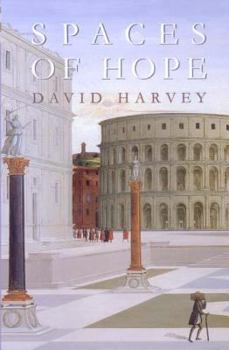Spaces of Hope
(Book #7 in the California Studies in Critical Human Geography Series)
Select Format
Select Condition 
Book Overview
As the twentieth century drew to a close, the rich were getting richer; power was concentrated within huge corporations; vast tracts of the earth were being laid waste: three-quarters of the world's... This description may be from another edition of this product.
Format:Paperback
Language:English
ISBN:0520225783
ISBN13:9780520225787
Release Date:March 2000
Publisher:University of California Press
Length:293 Pages
Weight:0.05 lbs.
Dimensions:0.9" x 6.2" x 9.2"
Customer Reviews
3 ratings
A bit dry, but brilliant.
Published by Thriftbooks.com User , 21 years ago
There's a lot of theory here.Don't let it scare you away.This book is a brilliant examination of ideas that run modern society in America--and ideas that could have, but didn't. Harvey asks hard, delicate questions that poke at the very framework of modern society and makes you question assumptions about people and cities that you didn't even realize you had. Utopia has never been so interesting.The appendix, in which Harvey delineates a society wherein he uses the ideas he describes in the book, is extremely interesting and contradictory. Worth the price of the book alone.
Time and Space and Karl Marx
Published by Thriftbooks.com User , 23 years ago
In his introduction to "Spaces of Hope," David Harvey relates how much the times have changed since he began teaching Marx's Capital in the early 1970s. Back then, he didn't openly specify the content of the class in the course catalog -- he felt sure the powers that were at Johns Hopkins at the time would shut him down. At that time, he tells us, no one in U.S. academia (except for a few foreign professors) had ever really read Marx. The interest at that time was directly related to the recent "revolutionary" fervor time of the late 60s/early 70s wherein Mao and Che Guevera, the Weather Underground, etc., were countercultural icons and Marx's Captial was seen to be the source of their revolutionary program. When the Berlin wall came down, Marx's reputation as came down with it. Now, thirty years after he started teaching it, Harvey finds he has fewer students than ever, but that the text itself is perhaps even more relevant now than it has ever been. He notes that convincing others of its relevance is a difficlt task these days partly because there is no political apparatus to give weight to Marx's ideas, but also because post-modernism and identity politics have tended to denigrate mass political movements as "master narratives" that cannot be trusted. Harvey thinks it's time to get a new revolution going, and he thinks Marx's observations go a long way toward helping us think clearly about the world in which we live and how we might change it. After the personal note sounded in the introduction, Harvey then takes up his real program which is a history of the production of space and under capitalism in the service of trying to create his new revolutionary consciousness to ameliorate, sabotage, rewrite, or replace the prevailing capitalist discourse with new ways of seeing our bodies, the spaces we create and live in. He discusses our impact on the earth and other species and explores new forms of consciousness that grow out of that new sensitivity. At the center of the book is an examination of how deindustrialization has gutted his Baltimore over the past 30 years he's lived there, the rise of the racialized service economy, the rise of the real estate speculators in cahoots with city planners giving massive tax abatements in mostly failed attempts to revitalize the city. This is a subject Harvey knows intimately, and in his description of Baltimore's woes he tells the disheartening story of so many mid-sized American cities which have been struggling to stay afloat during the exportation of blue collar jobs starting in the 70s. Harvey's chapters on the body as an accumulation strategy (quoting Donna Haraway) offer a good history and discussion of the post-modern rejection of the Des Cartes body/mind duality. He considers the body in the Foucauldian sense of society and its spaces and regimes enforcing discipline and docility, and also considers how our bodies are shaped by capital -- work hours, repetitive acts, the food we eat, the tobacco
Past the 3rd way
Published by Thriftbooks.com User , 24 years ago
In this work, Harvey seems much more explicitly concerned with the political than in his previous works. While his former works provide excellent an analysis of the present situation, it is this book that takes that total (Marxist) critique, and then provides an analytic from which effective political resistance to the third way might emerge. He argues that those in opposition must be, in some ways, Utopian; that a large part of the failure of critiques of the third way have been that they can dangle no carrot that looks any better.An understanding of Harvey's prior works, especially Justice, Nature, and the Geography of Difference, as well as Limits to Capital would probably be very helpful to a complete understanding of this work.





